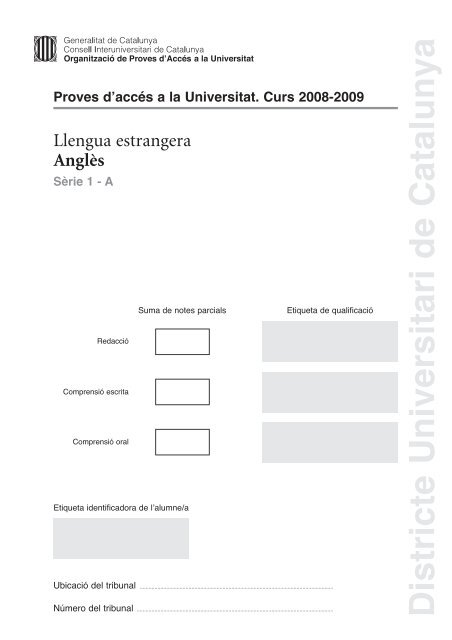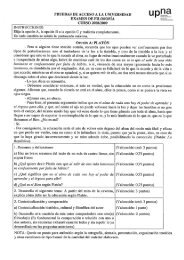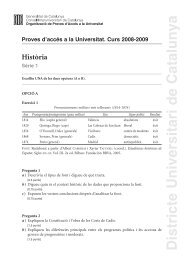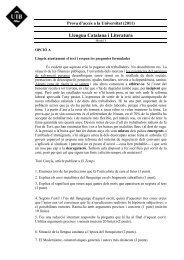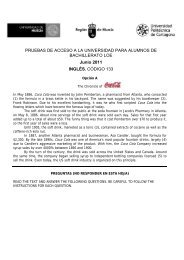Proves d'Accés a la Universitat. Enunciat - Examenes de Selectividad
Proves d'Accés a la Universitat. Enunciat - Examenes de Selectividad
Proves d'Accés a la Universitat. Enunciat - Examenes de Selectividad
Create successful ePaper yourself
Turn your PDF publications into a flip-book with our unique Google optimized e-Paper software.
<strong>Proves</strong> dʼaccés a <strong>la</strong> <strong>Universitat</strong>. Curs 2008-2009<br />
Llengua estrangera<br />
Anglès<br />
Sèrie 1 - A<br />
Redacció<br />
Comprensió escrita<br />
Comprensió oral<br />
Suma <strong>de</strong> notes parcials<br />
Etiqueta i<strong>de</strong>ntificadora <strong>de</strong> lʼalumne/a<br />
Etiqueta <strong>de</strong> qualificació<br />
Ubicació <strong>de</strong>l tribunal ...................................................................................................................................<br />
Número <strong>de</strong>l tribunal .....................................................................................................................................<br />
Districte Universitari <strong>de</strong> Catalunya
2<br />
ORGANIC FARMING<br />
In recent years, organic farming has ma<strong>de</strong> its own impact on the farming community.<br />
Encouraged by the general public’s awareness of chemical use in the environment, growers are<br />
becoming more aware of the <strong>de</strong>mand for organically farmed produce.<br />
Laura Davis, a young organic farmer, grew up in London, far away from the small country<br />
vil<strong>la</strong>ge she <strong>la</strong>ter moved to. Although not from an agricultural background, she wanted to live<br />
off what the <strong>la</strong>nd provi<strong>de</strong>s. Joining Lawrence Watts on a 32 acre farm in Dorset provi<strong>de</strong>d her a<br />
perfect opportunity to become a farmer and be self-sufficient, which is what both of them had<br />
wanted for a long time. “It was perfect really,” she says. “We never consi<strong>de</strong>red using chemicals,<br />
so we were organic from the start almost without being aware of it. The <strong>la</strong>nd here had never<br />
been intensively farmed. It was all permanent pasture.” Later, when they <strong>de</strong>ci<strong>de</strong>d they could<br />
start selling their own products, both Laura and Lawrence took part-time courses at the local<br />
agricultural college. “It was a general course, not specialised in organic farming,” Laura<br />
exp<strong>la</strong>ins, “but we learned a lot of useful things that we can apply to our daily running of the<br />
farm. Since then we have learned that organic produce is increasingly in <strong>de</strong>mand and we have<br />
become a viable business.”<br />
“In fact, there is a tremendous confusion about what ‘organic’ means. We <strong>de</strong>scribe organic<br />
produce as the products of a sustainable system of farming that is environmentally harmless.<br />
In other words, ‘organic’ <strong>de</strong>scribes the system of farming rather than the produce itself. All <strong>la</strong>nd<br />
has a certain amount of naturally occurring chemicals in it. It’s also possible that your produce<br />
can be marginally contaminated by, for instance, the farmer next door. So it is wrong to suggest<br />
that the product is completely free of chemical residue.”<br />
Not everybody can <strong>la</strong>bel their products organic. The Soil Association is the body which<br />
approves <strong>la</strong>nd suitable for organic growing. Their inspectors issue a Soil Association symbol<br />
which can be used in the marketing of organic produce. To earn the symbol, <strong>la</strong>nd has to be free<br />
of chemical use for at least two years – sometimes longer, <strong>de</strong>pending on how it has been used<br />
previously. The organic farmer also has to <strong>de</strong>monstrate competence in organic farming. The<br />
Soil Association was in its infancy when Laura and Lawrence began, and they were among the<br />
first to be awar<strong>de</strong>d the symbol.<br />
When Laura and Lawrence first started operating commercially, their main challenge was<br />
the <strong>de</strong>livery of their products to their customers. The quantities and types of products they<br />
<strong>de</strong>man<strong>de</strong>d could vary greatly from week to week. Because they were supplying individually<br />
they had to try to meet as many <strong>de</strong>mands as possible. Providing that sort of variety and<br />
continuity all year round was not an easy task. In some cases the problem was ma<strong>de</strong> worse<br />
because of droughts. Now they sell their produce via a marketing cooperative, which is a group<br />
of 17 growers from various-size farms and many of the initial problems have disappeared.<br />
farming: (en aquest context) agricultura / (en este contexto) agricultura<br />
grower: granger -a, horticultor -a / granjero -ra, horticultor -ra<br />
produce: productes agrícoles / productos agríco<strong>la</strong>s<br />
live off: viure <strong>de</strong> / vivir <strong>de</strong><br />
<strong>la</strong>bel: etiquetar<br />
drought: sequera / sequía<br />
From Internet. Adapted
Part 1: Reading comprehension<br />
Choose the best answer according to the text. Only ONE answer is possible.<br />
[0.5 points each correct answer. Wrong answers will be penalized by <strong>de</strong>ducting 0.16 points. There is no penalty for<br />
unanswered questions.]<br />
1. Laura and Lawrence started a farm because they…<br />
■ knew organic produce was in <strong>de</strong>mand.<br />
■ wanted to grow their own food.<br />
■ had some knowledge of organic farming.<br />
■ had moved together to the country.<br />
2. Laura and Lawrence’s farm in Dorset…<br />
■ is a cooperative farm with 17 growers working in it.<br />
■ was bought from farmers that practised organic intensive agriculture.<br />
■ was not used to grow produce before they bought it.<br />
■ was used by a local agricultural college to train new farmers.<br />
3. According to Laura, the word “organic” <strong>de</strong>scribes…<br />
■ a type of food that is very natural.<br />
■ a kind of food that contains no trace of artificial chemicals.<br />
■ the use of farming methods that do not cause environmental damage.<br />
■ produce that is marginally contaminated by the farmer next door.<br />
4. The Soil Association…<br />
■ inspects the food grown on organic farms.<br />
■ <strong>de</strong>ci<strong>de</strong>s whether farmers are suitable for agriculture.<br />
■ distributes organic products for the farmers.<br />
■ <strong>de</strong>ci<strong>de</strong>s whether produce can be called organic.<br />
5. The Soil Association symbol can only be obtained if…<br />
■ you are going to use natural chemicals for two years.<br />
■ you belong to a marketing cooperative for organic products.<br />
■ your farming practices are approved by its inspectors.<br />
■ you win a competition against other organic farmers.<br />
6. Laura and Lawrence obtained their symbol…<br />
■ when the Soil Association was just starting to function.<br />
■ because they were not aware of having used chemicals.<br />
■ because they had a <strong>de</strong>gree from the local agricultural college.<br />
■ because they <strong>la</strong>belled their products organic.<br />
7. When they first started, Laura and Lawrence…<br />
■ had difficulty finding enough customers.<br />
■ had some problems meeting their customers’ needs.<br />
■ had logistical problems with their marketing cooperative.<br />
■ supplied their produce to only one customer.<br />
8. On the whole, the text suggests that organic farming is becoming<br />
more popu<strong>la</strong>r among growers because…<br />
■ they are no longer confused about what “organic” means.<br />
■ they are now forced to join marketing cooperatives to sell<br />
their produce.<br />
■ of a general ten<strong>de</strong>ncy towards protecting the environment.<br />
■ they can obtain marketing symbols from the Soil Association.<br />
Recompte <strong>de</strong> les respostes<br />
Nota <strong>de</strong> comprensió escrita<br />
A emplenar pel corrector/a<br />
No<br />
Correcta Incorrecta contestada<br />
Correctes Incorrectes No contesta<strong>de</strong>s<br />
3
4<br />
Part 2: Writing<br />
Choose ONE topic. Write about number 1 or 2. Minimum length: 100 words.<br />
[4 points]<br />
1. You are Laura. Write a letter to a friend in London telling him/her about your<br />
experience living in the farm and growing organic products.<br />
2. Using your own words, write an argumentative essay about the advantages of life in<br />
the city versus life in the country or vice versa.
PROVA AUDITIVA
6<br />
GOURMET GARBAGE<br />
In the following conversation you are going to hear some new words. Read and<br />
listen to them. Make sure you know what they mean.<br />
waste: <strong>de</strong>ixalles / <strong>de</strong>sperdicios<br />
foraging: cerca / búsqueda<br />
discard: rebutjar / <strong>de</strong>sechar<br />
squat: ocupar<br />
toss: llençar / tirar<br />
rummage: remoure / hurgar<br />
Ready?<br />
Now read the questions on the next page. Read them carefully before listening to<br />
the conversation.<br />
In the following interview Kymberly Matthews talks to Adam Weissman, well-known<br />
New York City animal activist and lea<strong>de</strong>r in the growing freegan movement.<br />
[Now listen to the interview.]
QUESTIONS<br />
Choose the best answer according to the recording. Only ONE answer is correct.<br />
[0.25 points each correct answer. Wrong answers will be penalized by <strong>de</strong>ducting 0.08 points. There is no penalty for<br />
unanswered questions.]<br />
1. According to Adam, many times items are thrown out…<br />
■ because they are no longer in brand new condition.<br />
■ because customers have discar<strong>de</strong>d the new mo<strong>de</strong>ls.<br />
■ because customers ask for the old mo<strong>de</strong>ls.<br />
■ even though they are in brand new condition.<br />
2. Where does Adam usually have breakfast?<br />
■ On the street on the way to the bus station.<br />
■ At the city supermarkets.<br />
■ He eats the food that he has in his refrigerator.<br />
■ He doesn’t eat breakfast because he has no food in his refrigerator.<br />
3. What is a “free market”?<br />
■ A market where people donate things they no longer want.<br />
■ A market where you can walk freely while you buy things.<br />
■ A p<strong>la</strong>ce where people teach you how to toss your things.<br />
■ A store that sells p<strong>la</strong>nts from city parks.<br />
4. Freegans typically squat because…<br />
■ they like to freeze to <strong>de</strong>ath in abandoned buildings.<br />
■ it is a way to fight the system.<br />
■ they don’t like to live in <strong>de</strong>crepit buildings.<br />
■ <strong>la</strong>ndlords and the municipal governments find abandoned<br />
buildings for them.<br />
5. How do freegans help the environment?<br />
■ By using automobiles and petroleum.<br />
■ By consuming oil from restaurants.<br />
■ By using bicycles.<br />
■ By causing ecological disasters with their methods of travel.<br />
6 A vegan is a person who…<br />
■ eats only eggs and milk products.<br />
■ doesn’t eat meat, eggs or milk products.<br />
■ can choose to eat meat, eggs or milk products.<br />
■ has no objections for those who eat meat.<br />
7. Adam dislikes organic farmers because they…<br />
■ don’t use pestici<strong>de</strong>s.<br />
■ are not animal-friendly.<br />
■ use mammals, birds and insects as pestici<strong>de</strong>s.<br />
■ are not vegetarians.<br />
8. People who learn about freeganism think that freegans…<br />
■ are not serious when they rummage in garbage.<br />
■ only recover dirty and <strong>de</strong>caying food.<br />
■ are freaks because they are covered by the media.<br />
■ are serious people, not freaks.<br />
Recompte <strong>de</strong> les respostes<br />
Nota <strong>de</strong> comprensió oral<br />
A emplenar pel corrector/a<br />
No<br />
Correcta Incorrecta contestada<br />
Correctes Incorrectes No contesta<strong>de</strong>s<br />
7
Etiqueta i<strong>de</strong>ntificadora <strong>de</strong> lʼalumne/a<br />
Etiqueta <strong>de</strong>l corrector/a<br />
LʼInstitut dʼEstudis Cata<strong>la</strong>ns ha tingut cura <strong>de</strong> <strong>la</strong> correcció lingüística i <strong>de</strong> lʼedició dʼaquesta prova dʼaccés


